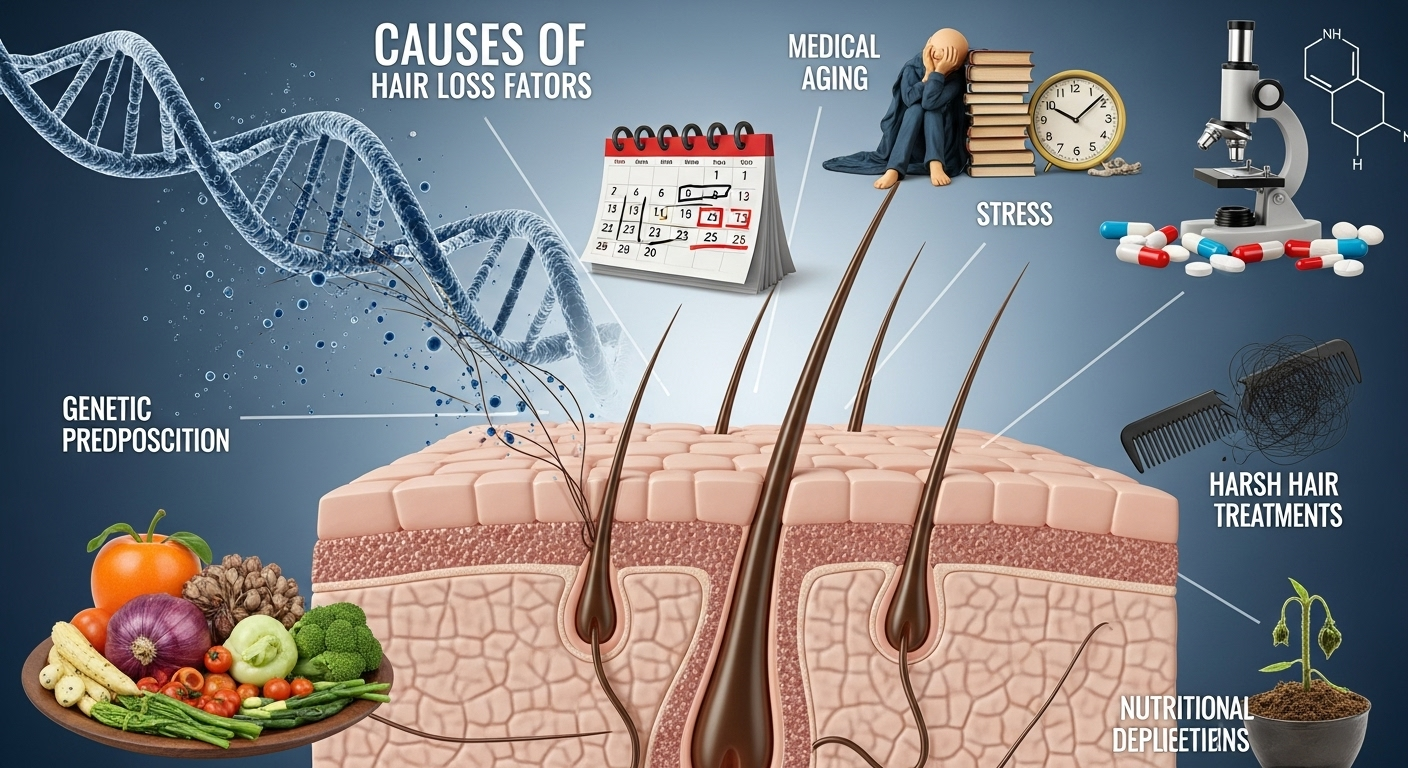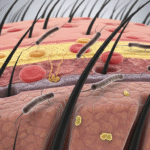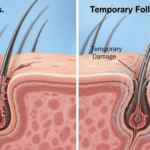Are you noticing more hair in your comb than usual? Hair fall in males is a common concern, with various potential causes ranging from genetics to lifestyle factors. In this article, we will delve into the primary Powerful Reasons for Hair Fall in Males, offering you clear insights into how to prevent or manage it. …
Are you noticing more hair in your comb than usual? Hair fall in males is a common concern, with various potential causes ranging from genetics to lifestyle factors.
In this article, we will delve into the primary Powerful Reasons for Hair Fall in Males, offering you clear insights into how to prevent or manage it.
Understanding these causes is the first step toward taking control of your hair’s health. We’ll also explore practical tips and expert advice on how to reduce hair fall and regrow your hair.
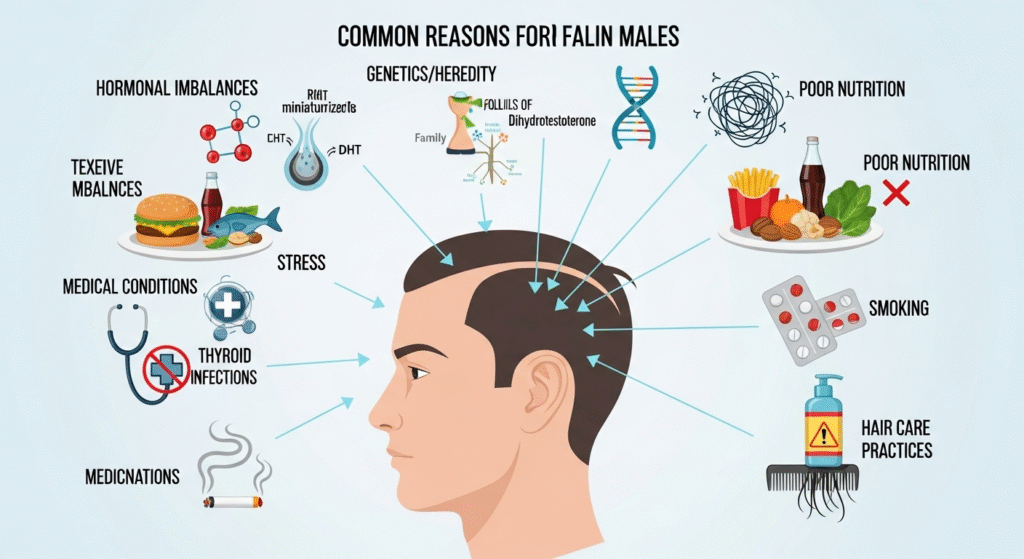
Common Reasons for Hair Fall in Males
Hair loss in males is often triggered by a combination of genetic, hormonal, and environmental factors. By identifying the root cause, you can take the necessary steps to address it.
Genetic Factors and Male Pattern Baldness
Genetics play a significant role in male hair fall. The most common type of hair loss among men is male pattern baldness (MPB), also known as androgenic alopecia. This condition is typically inherited from either parent and results in a gradual thinning of hair on the scalp, particularly in the crown and temples.
- How it works: Male pattern baldness occurs due to a combination of genetics and an increase in the hormone dihydrotestosterone (DHT). DHT affects hair follicles, causing them to shrink over time and eventually leading to hair fall.
- Prevalence: About 50% of men experience male pattern baldness by the age of 50. The condition is progressive and worsens with age.
Powerful Reasons for Hair Fall in Males: Hormonal Changes and Imbalance
Hormonal changes and imbalances can also contribute to hair fall. Testosterone, the male sex hormone, is linked to hair loss through its conversion into DHT. An excess of DHT in the scalp is a major contributor to male pattern baldness.
- Androgenic Alopecia: This is the condition caused by high levels of DHT, leading to the shrinking of hair follicles and eventual hair loss.
- Other Hormonal Factors: Changes in testosterone levels due to aging, medical conditions, or medications can also result in temporary or permanent hair loss.
Nutritional Deficiencies
A poor diet or lack of essential nutrients can significantly affect the health of your hair. Deficiencies in vitamins and minerals, such as iron, zinc, vitamin D, and biotin, can lead to thinning hair or hair loss.
- Vitamin D: Crucial for hair follicle cycling, a deficiency may lead to hair shedding.
- Iron: Low iron levels can cause anemia, which disrupts the hair growth cycle.
- Biotin: A deficiency in this vitamin can lead to brittle hair and breakage.
Environmental and Lifestyle Factors Contributing to Hair Fall
Several everyday factors can accelerate hair fall in men. By making simple lifestyle changes, you can prevent and minimize damage.
Stress and Anxiety
Chronic stress is a major contributor to hair loss. When under stress, the body enters a “fight-or-flight” mode, which can push hair follicles into a resting phase, causing hair to shed.
- Telogen Effluvium: This is a temporary condition triggered by stress, where hair enters a resting phase and falls out more than usual.
- Managing Stress: Practicing mindfulness, yoga, and deep breathing exercises can help reduce stress and prevent hair fall.
Poor Hair Care Practices
Improper hair care practices such as frequent washing with harsh shampoos, excessive heat styling, or tight hairstyles can damage the hair and cause it to fall out.
- Heat Damage: Overuse of hairdryers, straighteners, or curling irons can weaken hair strands, leading to breakage.
- Tight Hairstyles: Styles like ponytails or braids can cause tension on the scalp, leading to traction alopecia, a form of hair loss.
Smoking and Alcohol Consumption
Both smoking and excessive alcohol consumption can harm your hair. Smoking restricts blood flow to hair follicles, which deprives them of oxygen and nutrients necessary for healthy growth. Alcohol can dehydrate the body and lead to nutrient deficiencies that impact hair health.
Medical Conditions and Hair Fall
In some cases, medical conditions may be responsible for hair loss. It’s essential to consult a doctor if you suspect a health condition is contributing to your hair fall.
Thyroid Imbalances
Both hypothyroidism and hyperthyroidism can lead to hair thinning and shedding. The thyroid gland regulates metabolism and overall body functions, including hair follicle growth.
- Hypothyroidism: In this condition, the thyroid produces too little hormone, slowing down hair growth.
- Hyperthyroidism: An overactive thyroid can accelerate hair shedding.
Scalp Infections and Inflammation
Conditions like seborrheic dermatitis, dandruff, or fungal infections can cause inflammation in the scalp, disrupting hair growth and leading to hair fall.
- Scalp Treatments: Topical treatments like antifungal shampoos or steroids can help alleviate inflammation and restore a healthy scalp environment.
Medication Side Effects
Certain medications can cause hair loss as a side effect. Chemotherapy, antidepressants, blood thinners, and high blood pressure medications are among the most common culprits.
- Temporary Hair Loss: Hair typically regrows once the medication is discontinued or changed.
How to Prevent Hair Fall: Expert Tips
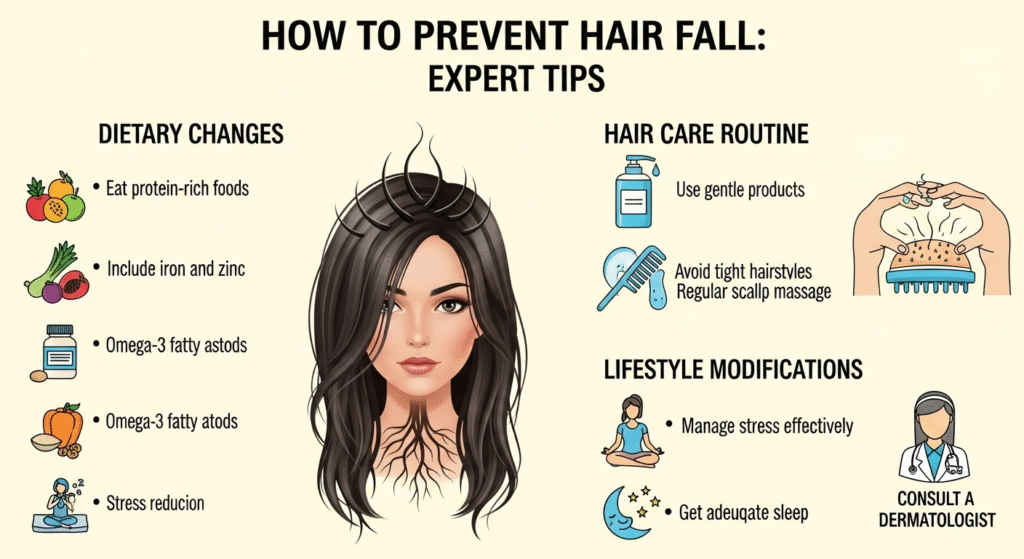
Once you’ve identified the cause of your hair loss, implementing effective prevention strategies can make a significant difference.
Healthy Diet for Healthy Hair
Ensure that your diet is rich in essential vitamins and minerals to support hair health.
- Foods to Include: Fish, nuts, leafy greens, eggs, and citrus fruits.
- Supplements: Biotin and other vitamins may help if you have specific deficiencies.
Stress Management Techniques
Incorporate stress-reduction practices such as yoga, meditation, or regular exercise to help keep stress at bay.
- Mindfulness: Try mindfulness techniques such as guided meditation or deep breathing.
Choosing the Right Hair Care Products
Avoid harsh chemicals and opt for gentle, nourishing shampoos and conditioners that promote scalp health.
- Product Suggestions: Look for sulfate-free products or natural oils like argan oil for nourishment.
When Should You Seek Professional Help?
If you are experiencing significant or rapid hair loss, seeking professional help is crucial.
Recognizing Early Signs of Severe Hair Loss
If you notice receding hairlines, bald spots, or excessive shedding, it may be time to consult a specialist.
Consultation and Treatment Options
There are various treatments for hair loss, from minoxidil and finasteride to advanced options like PRP therapy or hair transplants.
- Hair Transplant: In cases of severe hair loss, a consultation with a qualified specialist can help you determine if a hair transplant is right for you.
FAQs
What is the main cause of hair fall in males?
Male pattern baldness is the leading cause of hair loss in men, though other factors like stress, poor diet, and hormonal changes can contribute.
Can stress cause hair loss in men?
Yes, stress can trigger telogen effluvium, a condition where hair enters the shedding phase prematurely.
Are there home remedies for hair loss in males?
Some home remedies like massage with coconut oil or green tea rinses may help, but their effectiveness varies.
Conclusion and Next Steps
Understanding the reasons for hair fall in males is the first step in managing and preventing it. By addressing the underlying causes—whether genetic, hormonal, or lifestyle-related—you can take proactive steps toward healthier hair.
Book a consultation with Dr. Uzma Irfan, an ISHRS-certified surgeon in Islamabad today to explore personalized treatment options and find the best solution for your hair restoration journey.

